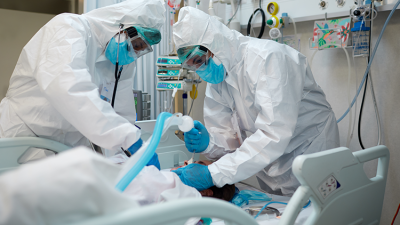Spanish Doctors Say High-Dose Vitamin D Cuts Risk of Death from COVID-19 by 60 Percent

All Global Research articles can be read in 51 languages by activating the “Translate Website” drop down menu on the top banner of our home page (Desktop version).
***
A team of researchers from Hospital del Mar in Barcelona, Spain, recently examined whether high-dose vitamin D can reduce the risk of death in hospitalized coronavirus patients. Impressively, they found that if given early enough the vitamin cut the risk of death by a dramatic 60 percent. This suggests an outcome twice as effective as that attributed to the steroid dexamethasone, a medication currently considered the most effective drug for treating the virus. Patients given vitamin D in the study were also found to be 80 percent less likely to need intensive care treatment. Significantly, these findings have been widely promoted in the international media.
The researchers followed a total of 930 coronavirus patients, 551 of whom were randomly assigned to receive vitamin D alongside standard coronavirus treatment. Patients receiving vitamin D were given a dose of 532 micrograms on day 1, followed by a dose of 266 micrograms on days 3, 7, 15, and 30.
From the 551 patients given vitamin D, a total of just 30 (5.4 percent) required intensive care treatment. By comparison, from the 379 patients not given supplemental vitamin D, a total of 80 (21.1 percent) required intensive care treatment. Only 6.5 percent of the patients given vitamin D died, while 15 percent of those who were not given it died. After adjusting the data to take account of factors such as age, gender, vitamin D levels at the beginning of the study, and the presence of other diseases, the researchers concluded that patients given vitamin D had a reduced risk of requiring intensive care treatment and a lower mortality risk.
While awaiting peer-review of their study the researchers had initially published their findings online in preprint form. Following a storm of protest by certain so-called ‘experts’, however, the paper was subsequently taken offline. One particularly vocal opponent, Naveed Sattar, a Professor of Metabolic Medicine at the University of Glasgow in Scotland, claimed it was “not a useful study.” Tellingly, perhaps, Sattar has served as an advisor, consultant, speaker, or member of a speakers bureau for drug companies including Amgen, AstraZeneca, Boehringer Ingelheim, Bristol Myers Squibb, Lilly, and Merck. He has also received grants from Merck.
Politicians starting to promote vitamin D
This study is hardly the first to link vitamin D with the prevention or treatment of coronavirus infection. Researchers at the Boston University School of Medicine in the United States have already shown that having adequate levels of vitamin D reduces complications and death in coronavirus patients, for example.
Similarly, researchers in the UK have looked at 20 European countries and compared average levels of vitamin D with coronavirus infection rates and mortality. They found that people with low levels of the micronutrient may be more likely to die after contracting the virus.
It has also been shown that people with insufficient vitamin D have 60 percent higher rates of coronavirus infection compared to those having adequate amounts. Other research has found that, in combination with magnesium and vitamin B12, daily doses of vitamin D3 can reduce disease severity in older coronavirus patients.
Promisingly, therefore, politicians in some countries are beginning to pick up on these findings and promote the use of vitamin D. In the United States, Representative Glenn Grothman has recently introduced a House Resolution to recognize the significant role it may play in the fight against COVID-19.
David Davis, a British politician, has also become a prominent campaigner for the use of vitamin D and recently spoke about it in the UK House of Commons. Citing the example of the Andalusia region in Spain, where there has been widespread distribution of vitamin D to care home residents and some patients, Davis explained how the death rate had almost halved. Describing vitamin D as a “cheap, safe and apparently effective treatment”, he urged Prime Minister Boris Johnson to ask his advisors to “look urgently, again, at the very latest Spanish research.”
While Boris Johnson’s government had already committed to distributing free low-dose vitamin D supplements to at-risk groups in the UK, as yet only a limited number of people have been receiving them. As a result, over the same period that the death rate from the virus halved in Andalusia, the rate in the UK more than doubled.
If used alongside vitamin C and a combination of other micronutrients including certain minerals, amino acids and plant extracts, vitamin D can clearly play an important role in helping bring the pandemic to an end. Towards this goal it is up to all of us to share this lifesaving science-based information as widely as possible.
*
Note to readers: please click the share buttons above or below. Forward this article to your email lists. Crosspost on your blog site, internet forums. etc.
Paul Anthony Taylor is Executive Director of the Dr. Rath Health Foundation and one of the coauthors of our explosive book, “The Nazi Roots of the ‘Brussels EU’”, Paul is also our expert on the Codex Alimentarius Commission and has had eye-witness experience, as an official observer delegate, at its meetings. You can find Paul on Twitter at @paulanthtaylor
Featured image is from Dr. Rath Health Foundation

